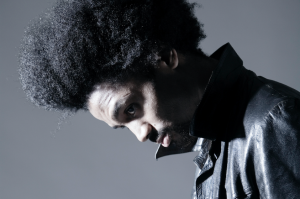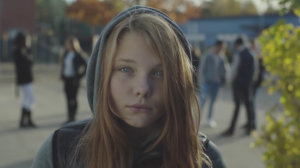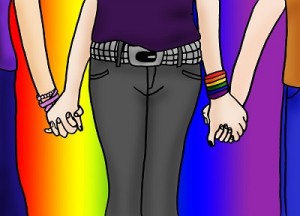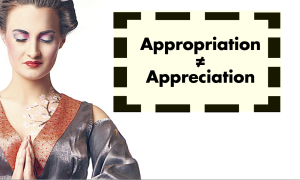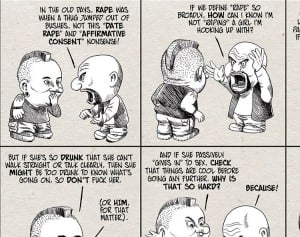Being Black in the United States is already like no other experience.
But when you add being a Mexican immigrant and not understanding how Blackness and Latinidad intersected – well, that made me a very confused and frustrated child.
For example, in my Latinx community, I was often advised by well-meaning folk to go to the barbershop more often because shaving off my afro made me look handsome.
In the voice of one of my unsolicited advisors, it would be “una pena” (a shame) to be perceived as “a negro” with “ese pelo feo” (that ugly hair).
With so many people directly letting me know they didn’t like my afro, I began to believed that it was ugly and dirty.
What I didn’t know, however, was that my hair is one of the most political parts of my body, as it is what lets people know that I am a child of the African Diaspora, a child of ancestors that were taken from their land, and shipped to Latin America during the slave trade.
As I grew more conscious and began to understand that I was both Black and Mexican, I began to ask other Afro-Latinxs about their hair and learned that I wasn’t the only one who was taught to hate it.
The earliest memory I have of being Black in the US was when bilingual education ended in Boston and my mother and I moved to the suburbs – where my classmates were no longer all Latinx and African American, but all white (except for five of us).
“Do you miss Haiti?” a White woman asked me, as my mom was enrolling me in school.
I remember just looking at her without a response. Eager to talk to me, she opened her mouth again and, this time, in a funny accent said, “Bonjour.”
I didn’t know what Haiti was, but I recognized “bonjour” from a restaurant that the public bus would always drive by, but why was she saying it to me? I didn’t speak French.
I had a very obvious Spanish accent.
Little did I know at that time that my Black Latinx body would be one of confusion, ridicule and frustration for a lot of people as I navigated life in the United States.
1. My Afro Became a Playground for Other Kids
Since I was constantly told that my hair was ugly, I felt special when people expressed interested in it. However, my classmates would always want to touch it and, afraid to say no, I let them.
Some were so enthused with my afro that they’d glide their hands through my hair until their fingers would get stuck in my curls. When they tried to pull their fingers out, they’d always manage to pull some of my hairs out as well.
With a thick Spanish accent, and an Afro, my classmates would always giggle about how different I was.
I thought I was different because I was from Mexico, but what was really going on was that my classmates had never really interacted with a Black person.
There’s something about White suburbs that puts Black youth in danger.
Perhaps it’s the fact that Black bodies are always so obviously there, yet invisible. Or maybe its because, after such a long history of Blacks being segregated from White schools, when Black students enter one, they have to endure the discomfort and racist curiosity of White youth.
2. My Own Latinx Community Encouraged Me to Shave My Afro to Avoid Looking ‘Aggressive’
Although a lot of the Latinxs in my life were great people, they were also significantly anti-Black. It’s one thing to give me a complement on a haircut, and it’s distinctly another thing to bluntly say that my afro was ugly.
You’re no longer celebrating a change in hair length, or design, but rather, you’re celebrating the removal of what my afro says about me – that I’m a Black.
Straight and semi-curly hair isn’t attached to a race the way that wild curly afros are. So clearly, all the compliments I got when I shaved my hair were actually for appearing less Black, or may I say, less threatening to the Latinx community.
One of the big ways I have noticed anti-Blackness in the Latinx community is in restrictions on dating other curly haired folk.
Many of my friends have told me about their community rejecting either them for having afros (being Black) or their partners for being Black.
Latinxs have internalized the notion that they have a duty “to maintain the Latinx race,” or make it better by dating a lighter skinned person.
However, there is no such a thing as “maintaining the race” or “bettering the race.”
There is no such thing as a Latinx race, there is no skin tone that yells “Latinx,” and there is no way that marrying a Spaniard, or other type of European, is going to make the Latinx race better!
Often, being Afro-Latinx, Indigenous-Latinx, or a Latinx from the Chinese and Korean diaspora means that a person does not qualify as Latinx, but rather, someone who is unfit to maintain the Latinx race.
A lot of Latinx community members (especially migrants) have not met too many Black folk because Afro-Latinxs are congregated in patches all over Latin America where ports of entry were established during the slave trade.
If a Latinx migrant lived nowhere near those ports, then they may have never encountered an Afro-Latinx.
In fact, the Latinx community has learned that Blacks are bad and wild through the media and telenovelas (soap operas) that often depict them as unintelligent, dirty, poor, and in many television cartoons, Blacks are represented as monkeys. From these depictions, the Latinx community believes that Blacks threaten the Latinx “race.”
Acknowledging Afro-Latinidad will only get us closer to a communal healing process that acknowledges that we are in pain as people whose indigenous cultures and black cultures have been put through genocide after genocide.
3. According to White People, My Afro Was Unprofessional, Unintelligent, and a Joke
When I was finally in high school (first person to even make it to the ninth grade in my family) and applying to colleges, one of my high school teachers recommended that I clean up, meaning shaving my afro, for my college interview – so that I would appear “professional and serious.”
Really, really!?
What she meant was that I was too Black, and that I should shave my afro so that I could be more Latinx. That way, I’d have higher chances of winning the interviewer over because, clearly, I’d be less threatening as a Latinx than a Black student with a Mexican accent.
What I learned from this experience is that maybe the anti-Blackness in the Latinx community didn’t come out of nowhere. In fact, as people of color, Latinx also experience racism. However, in experiencing racism, Latinx learn to also see other people of color as bad, or lesser.
Therefore, Latinx communities begin to act in ways that White Supremacy has taught them to interact with the world – which privileges them – especially since a lot of Latinxs are also very light skinned and might even be perceived as White.
My Afro challenged White Supremacy, so it was an issue for both the White community and the Latinx community that had internalized the views of White Supremacy.
4. After Joining the Undocumented Movement, I Always Had to Pick a Side – Latinx or Black, Never Both
Again, within my local undocumented community, I began to pick out the ways in which White Supremacy was manifesting. I remember always talking about xenophobia, but never mentioning anti-Blackness.
I mean, how can you talk about the fear and discomfort of immigrants without talking about anti-Blackness? After all, Black folk were actually taken from their countries, forced to migrate all over the world, and turned into slaves.
There really can’t be an immigration narrative without acknowledging that Black bodies have been violated all throughout history due to migration.
Although I was an Afro-Latinx, I was often only racialized as Latinx after I gave my speech about how I was actually born and raised in Mexico – and lived in an indigenous village with my grandmother and grew up with indigenous rituals and all other justifications to why I qualified as Latinx.
When I travelled to conferences and would meet other undocumented activists, some assumed that I was there as an ally because I was Black.
Even when we were having conversations of changing the narrative that undocumented migration was just a Latinx issue, we were failing in recognizing Black undocumented realities.
To this day, we have a good amount of undocumented Asian (but primarily East Asian) visibility, and rising undocumented European visibility, but the undocumented Black reality is still missing.
Thankfully, I began to meet undocumented Afro-Latinx women that radicalized my politics in ways that I could never imagine. I remember first meeting my friend Jase, whose Afro was huge, and together learning about our histories, and really challenging our identities.
Were we Black? Were we Latinxs? Were we just racially ambiguous?
These questions really allowed us to unpack in community, acknowledging that in the midst of unpacking who we were, there might be pain and denial, but that there was a healing process.
During our process, I also met Isabel, who kept challenging me. I remember having conversations with the both of them about dating, and about de-colonizing my own personal love, by stepping away from the Latinx mentality of maintaining the race.
In the light of so much anti-black racism in Latinx communities, Afro-Latinxs deserve spaces to love and affirm each other. So, for my other Black Latinxs, I want to say:
1. Your Afro Is Beautiful – Don’t Cut It!
When I finally saw my grandma after seventeen years of being undocumented, she saw my hair, and was sad that I hadn’t been treating it right, so she made me go get a haircut, and told the lady to just cut a little bit and make it look round.
When we were walking back, my grandma explained to me that our hair has memory, and it’s the memory of resistance. So, do not get rid of your hair.
Instead, treat it well, and don’t be afraid to ask other Afro-Latinxs what products, or home remedies they are using to perfect the wild-ness of our curls.
2. Your Hair Has Nothing to Do With Your Job
If anyone asks you to fix your hair, let them know that they have just demanded that you physically alter your body to fit in with their work culture, which is an ethical violation.
3. Your Afro Is Its Own Revolution
Afros were a central part of a revolution (that’s still going) against anti-Blackness in the United States.
In a video, Black Panther activist Kathleen Cleaver breaks it down for the world:
“All of us were born with our hair like this… because it’s natural… [there’s] a new awareness among Black people that their own natural physical appearance is beautiful. For so many years, we were taught only white people were beautiful, only straight hair…was beautiful… White people now want wigs like these. Dig it? Isn’t it beautiful?”
4. Your Afro Makes You Sexy!
Every time I was taught to hate my hair, I almost did, but there’s something magical about looking at myself in the mirror, and everyday, seeing my reflection screaming, “I am beautiful. My life matters. And damn, I look sexy.”
[do_widget id=’text-101′]
Alan Pelaez Lopez is an Afro-Indigenous migrant that grew up in Boston via La Ciudad de México, documenting their existence as an (un)docuqueer poet, jewelry designer, and a huge Frida Kahlo fan. Alan is currently in graduate school pursuing a degree in Comparative Ethnic Studies in the Bay Area, and a member of Familia: Trans, Queer Liberation Movement.
Search our 3000+ articles!
Read our articles about:
Our online racial justice training
Used by hundreds of universities, non-profits, and businesses.
Click to learn more


